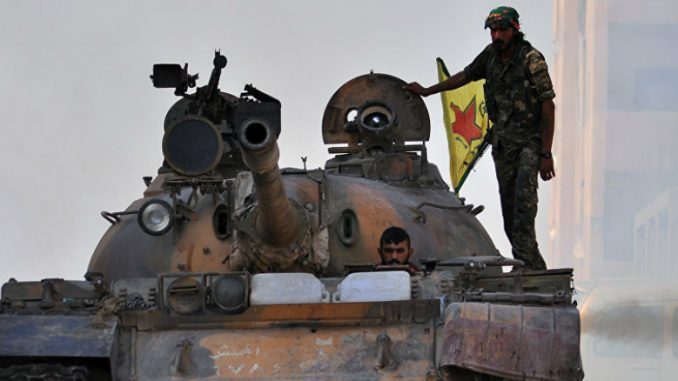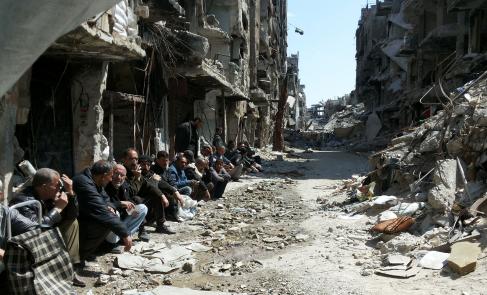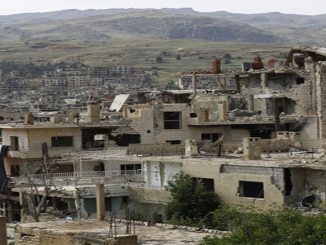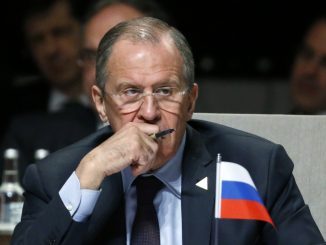
The first signs of an alliance between the Assad regime and Kurdish militias in northern Syria began to appear due to their mutual interests in creating new trade routes for the northern region, in addition to repelling Tukey’s advancement and undermining its plans in achieving a safe zone in the region.
The Syrian Democratic Forces (SDF) alliance, which is dominated by the Kurdish YPG militia, is supported by the US as the latter uses them in its war against ISIS.
Air strikes carried out by the US-led coalition and a long fight by the SDF forces ended in recapturing Manbij from the control of the Islamic State (ISIS) group last year, in addition to controlling large swathes of land in northern Syria.
The SDF, backed by US coalition, launched also a campaign with the ultimate aim of capturing Raqqa in November and succeeded in encircling the city. Recently, they launched an assault on Deir Ezzor province to cut the road to Raqqa and surrounding ISIS effectively.
Turkey sees the YPG as an extension of Kurdish PKK militants who have waged a three-decade insurgency in southeastern Turkey and started its own military operations to end both ISIS and Kurdish “threat” near its borders.
Close to the Kurdish-held areas
The Syrian Observatory for Human Rights said the army had captured some two dozen villages from Islamic State, bringing it to the edge of SDF-held areas south of Manbij.
The regime’s advance has taken place to the south of an area where Turkey and its rebel allies are having their own battles.
Assad regime forces have now come to the edge of a swathe of territory dominated by the Kurdish YPG militia, which has mostly avoided conflict with Damascus.
The advance, if sustained, could open a trade lifeline between the northeast, which is home to 70 percent of Syria’s oil and to rich farmland, and the west, where Syria’s manufacturing base is located.
The spokesman for the Syrian Democratic Forces (SDF), hailed the regime forces’ advance and ruled out any risk of a clash with them.
“On the trade front and on the civilian front it is seen as an excellent thing, because now there is … a link between the entire northern rural area,” spokesman Talal Silo said.
Now, he said, there was a direct route from the SDF-controlled town of Manbij to the city of Aleppo “via areas controlled by the SDF and areas controlled by the regime forces”.
There was no immediate comment from the Syrian military on its latest advances.
Silo said residents of the northeast who had previously depended on medical care in Aleppo and Damascus would be able to do so again. “All these matters are in the interests of the citizen,” he said.
The regime still has footholds in YPG-dominated northeastern Syria in the cities of Qamishli and Hasaka. The YPG also controls part of the city of Aleppo, where government forces and their allies defeated rebels in December.
This advance and close relation could lead to military alliance between the two sides who oppose Turkey’s intervention and aims in Syria. Together, they may be able to repel Turkey’s advancement to Manbij and undermine its plans in retrieving Raqqa and creating safe zones in northern Syria.
Creating new trade routes
Abdul Karim Saroukhan, head of the Kurdish-led administration, said a new land corridor to the government-controlled west marks an economic breakthrough for their self-proclaimed autonomous region that has been under “siege by hostile parties.”
“The opening of a corridor between us and Aleppo will have a great positive impact,” said Saroukhan, the head of the Kurdish-led administration in the northeast. “It is like an artery that will feed part of the Syrian body,” he said in an interview.
It holds out the prospect of a big boost to a region that is home to rich agricultural areas and oil fields but which has little in the way of its own manufacturing base.
“Our expectations are that we can reach understandings with everyone in the other provinces,” said Saroukhan, head of the biggest of three Kurdish administrations in northern Syria.
“The people of northeastern Syria – Kurds, Arabs and other groups – were particularly in need of medicines and construction materials to rebuild from the YPG’s conflict with Islamic State,” he added.
Northeastern Syria could, in turn, sell surplus agricultural output to other parts of the country, though Saroukhan said poor rainfall meant there would be no wheat for sale this season.
He also said surplus oil output from the region was looking for “exits, ways, crossings” to other parts of Syria, describing the area as the “oil well that supplied Syria for 65 years” and that “we can cooperate” in this regard.
He added that “while the oil was under YPG protection, it was a national resource whose status should be determined in a final settlement to the Syria crisis.”
Expected war with Turkey
Turkey sees the YPG as an extension of Kurdish PKK militants who have waged a three-decade insurgency in southeastern Turkey.
Erdogan said he wants to set up a safe zone near the Turkish border and clear the terrorism threat, which includes Kurdish forces as well as ISIS, from the area.
Therefore, Turkey sought to cast the YPG out of Manbij and to be the efficient part in Raqqa battle, and Turkish presedent has spoken about these matters with the US president Donald Trump recently
“Manbij and Raqqah are our next targets,” Erdogan said, adding that “The goal is to establish a safe, terror-free zone of 4 to 5,000 kilometers, and to prevent migration from Syria, and ensure the return of [Syrian] people who live now in our camps.”
Saroukhan said Turkey was afraid of the “democratic model” established in northern Syria and was trying to block it. He said that while the Kurdish-led administration wanted to deal with Turkey as a neighbor, Ankara was making threats and occupying Syrian land.
“If Turkey continues in this way, in this vein, it will be the start of a new war in Syria, in the north,” he said.
The commander of Kurdish fighters in Manbij, Adnan Abu Amjad, said that his forces will fight to defend any move by Turkey to take over the area.
Abu Amjad said: “If Erdogan wants to come to Manbij, it’s his business, but we will defend our city with all the strength we can find. As Syrian people, we’ll resist any interference in our internal affairs.”
Ilham Ehmed, co-leader of the Syrian Democratic Council, also declared similar comments.
“The military council and locals will mount fierce resistance if Manbij is attacked,” she told Sputnik news.
“Turkey has chosen the administration created in northern Syria as a direct target for its attacks. Turkey has openly stated that it is determined to launch an attack on the territory controlled by Kurdish forces. … Turkey has said that it plans to capture Manbij and Afrin after al-Bab,” she noted. Ankara has said that its Operation Euphrates Shield is primarily aimed at fighting ISIS, “however, there are no ISIS fighters in Manbij,” she added.
Ilham Ehmed suggested that Turkey is “not interested” in bringing peace and stability to Syria.
“Ankara is trying to take Syria under control by seizing Manbij and other regions. This lies at the heart of its intervention and combat operations in Syria,” she said.
The Syrian crisis began as a peaceful demonstration against the injustice in Syria. Assad regime used to fire power and violence against the civilians and led to armed resistance. 450.000 Syrians lost their lives in the past five years according to UN estimates, and more than 12 million have lost their homes.



